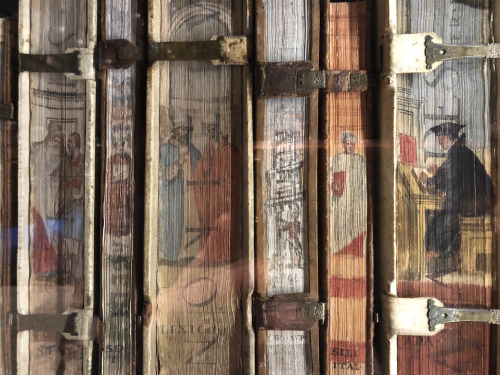Ancientpansy - AncientPansy

More Posts from Ancientpansy and Others

The road (1870) by Camille Pissarro






May 14th 1754 saw the rules of golf formalised at St Andrews with the foundation of the Society of St Andrews Golfers.
Twenty-two ‘Noblemen and Gentlemen’ contributed to a silver club to be played for annually over the Links of St Andrews. The first winner was Baillie William Landale, a St Andrews’ merchant, who became Captain for the year.
The competition was initially open to all golfers, as had been that of the Leith golfers ten years previously. The Leith golfers were specifically invited and brought their rules with them, which the St Andrews’ golfers used, with a small change to Rule 5. Thus began the foremost club in both Scottish golf history and world golf in general.
The first picture shows the hand-written rules of golf, which appear on the first page of the very first minute book of the Society of St Andrews Golfers. You can see that rule five was maybe amended after the initial rules were written down. The second pic is of James and Alexander Macdonald the sons of Sir Alexander Macdonald of Macdonald, a great Highland chieftain with estates on the Isle of Skye, although the pic is from 1749, before date “celebrated” today, I think it interesting as it shows one of the boys wit a golf club, showing that golf was already a well-established pastime in Scotland by this time.
The society later became known as the Royal and Ancient Golf Club of St.Andrews.
I’d like to add about the lat pic of the Macdonald brothers, if you see the one on the right, Alexander, is wearing a kilt, many people would have you believe it it was a Victorian invention, the date of this painting clearly shows that is not the case.

The Death of Icarus, by Alexandre Cabanel


Azure Grotto, Naples (1841) by Ivan Aivazovsky




Dunsborough Park, Surrey
lhackett

Refuge Before a Storm (1880) by Paul Merwart

By Ekaterina Belinskaya

Decorated pages from the Beinecke Rare Book Library at Yale University


“Morning light can make the most vulgar things tolerable” — the secret history, by donna tartt.
-
 ancientpansy reblogged this · 1 week ago
ancientpansy reblogged this · 1 week ago -
 ancientpansy liked this · 1 week ago
ancientpansy liked this · 1 week ago -
 mggt1017 liked this · 1 week ago
mggt1017 liked this · 1 week ago -
 pacificoceanwanderlust reblogged this · 1 week ago
pacificoceanwanderlust reblogged this · 1 week ago -
 pacificoceanwanderlust liked this · 1 week ago
pacificoceanwanderlust liked this · 1 week ago -
 navalarchitecture liked this · 1 week ago
navalarchitecture liked this · 1 week ago -
 thatsallfolks2 reblogged this · 1 week ago
thatsallfolks2 reblogged this · 1 week ago -
 thatsallfolks2 liked this · 1 week ago
thatsallfolks2 liked this · 1 week ago -
 foreverfitnesspositivity liked this · 1 week ago
foreverfitnesspositivity liked this · 1 week ago -
 old-school-new-world reblogged this · 1 week ago
old-school-new-world reblogged this · 1 week ago -
 binmen333 liked this · 1 week ago
binmen333 liked this · 1 week ago -
 verybluebirdkingdom reblogged this · 1 week ago
verybluebirdkingdom reblogged this · 1 week ago -
 megadimos reblogged this · 1 week ago
megadimos reblogged this · 1 week ago -
 violetasworld liked this · 1 week ago
violetasworld liked this · 1 week ago -
 serhat25 liked this · 1 week ago
serhat25 liked this · 1 week ago -
 niconicot reblogged this · 1 week ago
niconicot reblogged this · 1 week ago -
 alanturing59 liked this · 1 week ago
alanturing59 liked this · 1 week ago -
 claudiofo liked this · 1 week ago
claudiofo liked this · 1 week ago -
 haithamh reblogged this · 1 week ago
haithamh reblogged this · 1 week ago -
 haithamh liked this · 1 week ago
haithamh liked this · 1 week ago -
 loveblackwomanfan liked this · 1 week ago
loveblackwomanfan liked this · 1 week ago -
 deepbrownearth reblogged this · 1 week ago
deepbrownearth reblogged this · 1 week ago -
 brocantevintage liked this · 1 week ago
brocantevintage liked this · 1 week ago -
 nycindy21 liked this · 1 week ago
nycindy21 liked this · 1 week ago -
 shannybangbang liked this · 2 weeks ago
shannybangbang liked this · 2 weeks ago -
 queen-morgana-blog liked this · 2 weeks ago
queen-morgana-blog liked this · 2 weeks ago -
 deepbrownearth liked this · 2 weeks ago
deepbrownearth liked this · 2 weeks ago -
 serhanyazar liked this · 2 weeks ago
serhanyazar liked this · 2 weeks ago -
 legendarycashshoekid reblogged this · 2 weeks ago
legendarycashshoekid reblogged this · 2 weeks ago -
 legendarycashshoekid liked this · 2 weeks ago
legendarycashshoekid liked this · 2 weeks ago -
 kayamir liked this · 2 weeks ago
kayamir liked this · 2 weeks ago -
 goldylocks100 liked this · 2 weeks ago
goldylocks100 liked this · 2 weeks ago -
 wireli liked this · 2 weeks ago
wireli liked this · 2 weeks ago -
 zoubi67 liked this · 2 weeks ago
zoubi67 liked this · 2 weeks ago -
 nazzoma liked this · 2 weeks ago
nazzoma liked this · 2 weeks ago -
 tumtum74 reblogged this · 2 weeks ago
tumtum74 reblogged this · 2 weeks ago -
 sweetessenseoasis reblogged this · 2 weeks ago
sweetessenseoasis reblogged this · 2 weeks ago -
 sweetessenseoasis liked this · 2 weeks ago
sweetessenseoasis liked this · 2 weeks ago -
 its-hercollectionkoala liked this · 2 weeks ago
its-hercollectionkoala liked this · 2 weeks ago -
 bwboise liked this · 2 weeks ago
bwboise liked this · 2 weeks ago -
 purpletopaz liked this · 2 weeks ago
purpletopaz liked this · 2 weeks ago -
 akhenaton70 reblogged this · 2 weeks ago
akhenaton70 reblogged this · 2 weeks ago -
 akhenaton70 liked this · 2 weeks ago
akhenaton70 liked this · 2 weeks ago -
 doorswindowsgatespassages reblogged this · 2 weeks ago
doorswindowsgatespassages reblogged this · 2 weeks ago -
 dataspin40 liked this · 2 weeks ago
dataspin40 liked this · 2 weeks ago -
 beigewonderland liked this · 2 weeks ago
beigewonderland liked this · 2 weeks ago -
 wgm-beautiful-world reblogged this · 2 weeks ago
wgm-beautiful-world reblogged this · 2 weeks ago
Old things are always in good repute, present things in disfavor. Tacitus
3 posts